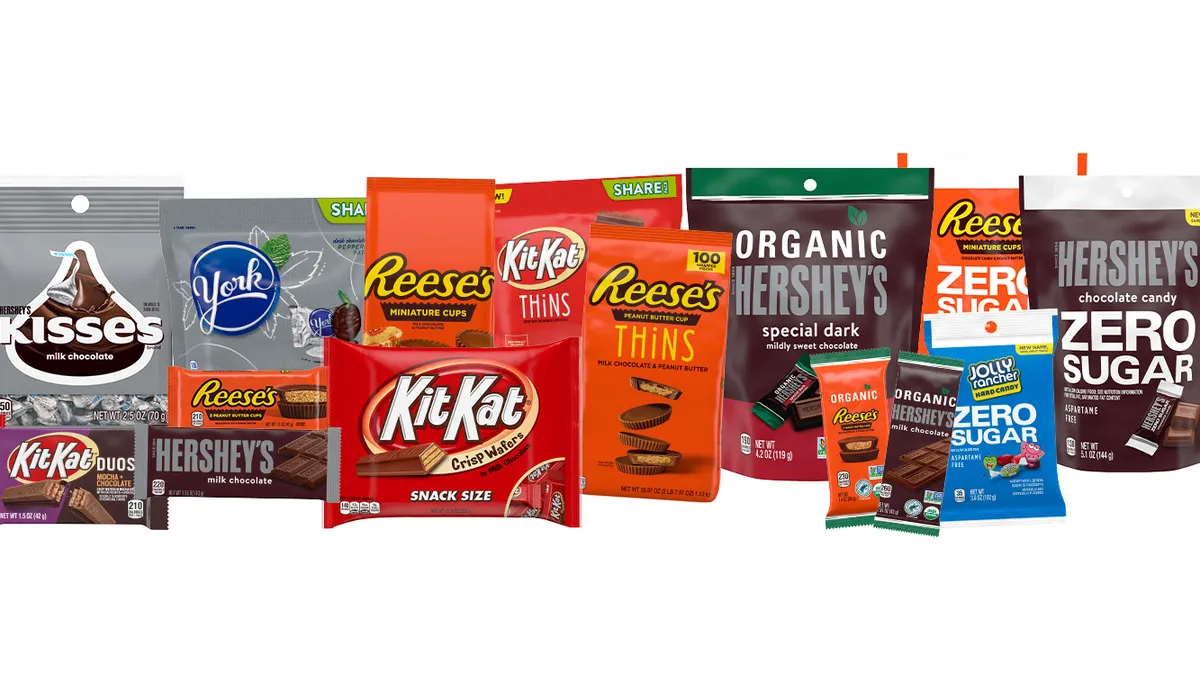Dive Brief:
- Hershey is mitigating omicron-induced challenges by rationalizing SKUs and placing two and three of the same product on shelves, also known as double- and triple-facing SKUs, CEO Michele Buck said in prepared remarks ahead of the company's Q4 earnings call last month.
- Despite offering less variety, Hershey's strategy has increased shelf space while freeing up capacity and reducing complexity, Steve Voskuil, senior VP and CFO, said in the earnings call.
- Limiting SKUs was a strategy frequently used by food and beverage makers early in the pandemic. While use of the strategy has decreased over time, it is still a common method to help drive operational efficiency, especially as inflation and supply chain constraints rise.
Dive Insight:
As omicron cases surged earlier this year, Hershey faced "higher absenteeism and pressured production at both our own facilities as well as our suppliers," said Buck. The company is working to add labor and capacity, but these challenges are expected to impact the speed at which Hershey can rebuild inventories, she said.
As a result, the candy and confectionery company shifted toward SKU rationalization with a focus on its most popular offerings versus products that are not performing well.
"On the SKU side, we see a minimal impact from that ... where we’ve had to make choices for things we can supply," said Voskuil. "We’ve been able to gain more facings and sell more core product. So net-net, that hasn’t been a big factor."
Production problems have been exasperated for food and beverage makers as the industry faces higher costs to produce and ship goods, labor shortages and bottlenecks, all of which creates further constraints on supply chains. Food prices have increased 7.4% over the last 12 months, according to the the U.S. Bureau of Labor Statistics' Consumer Price Index. In addition, unpredictable climate has led to shortages of some crops, and Russia's war on Ukraine is causing major CPGs to halt operations.
Hershey is just one of several companies to reexamine their product offerings. "The COVID-19 pandemic has prompted brands and manufacturers to step up reviews of SKU counts. This is largely due to shifting consumer demand, supply chain disruptions and rising economic uncertainty in light of unemployment and rising inflation," Tierney Wilson, SVP of client strategy and consulting at January Digital, said in an email to Supply Chain Dive.
Coca-Cola was "ruthlessly prioritizing to deliver on core SKUs" to drive efficiency in its supply chains and streamline operations for retail customers, CEO James Quincey said in an earnings call in April 2020, as the coronavirus first surged through the U.S. Mondelez reactivated its "COVID playbook" earlier this year amid rising inflation by simplifying operations and being "careful to invest in those brands where we have good supply," CEO Dirk Van de Put said in a Q4 earnings call.
"Often, the pursuit of growth can lead companies to develop or release too many products in their portfolios for the sole purpose of innovation," Wilson said. "However, if there is not a rigorous internal process for reviewing SKU impact to top and bottom-line revenue, then what was intended to be innovation can lead to negative business outputs."















